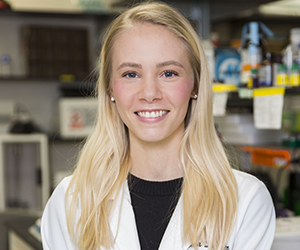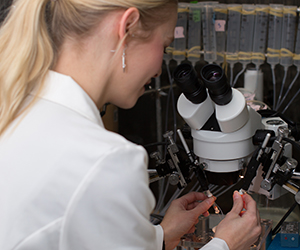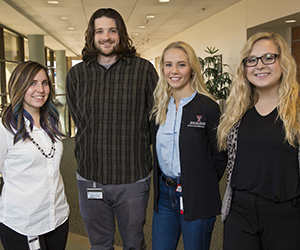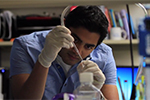
Growing up, Antonia Stuebler was surrounded by creativity. Her father, Andreas, is the master of light for the Friedrichstadt-Palast, considered the Europe’s biggest theatre stage with stunning productions in the heart of Berlin, Germany. Her mother, Gabriela, works for a light studio that focuses on architectural light concepts. Perhaps Antonia was destined to pursue a creative field. Instead, a trip from her home to Texas changed her path and led her to science.
Stuebler grew up in Berlin. As a high school student she took a chance on the German American Partnership Program (GAPP) and spent a year in Denton, Texas as an exchange student.
“My GAPP experience was a culture shock,” Stuebler said. “My English was not very good. Texas has the drawn out accent, and I was taught British English in school. Germany has a different culture, and adjusting to the new environment was challenging. But I loved the experience, the language and especially the freedom the U.S. provides to pursue your dreams.”
In addition to exploring the new Texas culture, Stuebler also had the opportunity to see how higher education worked in the U.S. She and her sister are both first-generation college graduates.
“My parents went only to the ninth grade,” Stuebler said. “Germany was divided and at one time pursuing an education was not permitted to everyone. Before the Berlin Wall came down, there were restrictions as to where you could travel and who received what education. My parents had to work their way up and that is why education is so important to them. They did not want us to take education for granted. So my parents have been a big influence. Without them I wouldn’t be here.”
Her GAPP host sister had studied at Texas Tech University (TTU), and when it came time to consider higher education, Stuebler moved to Lubbock in 2011 and in 2015, she completed her Bachelor’s of Science in biochemistry.
“My love of science came slowly at first,” Stuebler said. “Chemistry was the only subject I liked in high school and it pre-exposed me to what I would do later.”
I
Now seven years later, she has adapted to the U.S., and especially the Texas culture, and prides herself on her command of the English language. Stuebler’s transition from TTU to Texas Tech University Health Sciences Center (TTUHSC) was a bit easier then her first U.S. experience.
“I interviewed a lot of places, but I chose TTUHSC because Lubbock is built around the universities, and it’s like a family who values where you come from and are invested in the type of education you receive.”
Stuebler now works with Michaela Jansen, Ph.D., associate professor in the Department of Cell Physiology and Molecular Biophysics, researching pentameric ligand-gated ion channels, focusing on the serotonin 5-HT3A receptor.
“Dr. Jansen is very structured and organized and that was exactly what I was looking for,” Stuebler said. “Choosing the right mentor is a huge part of the experience. She employs a huge variety of techniques, and when I graduate that will hopefully make me more competitive for a post-doctoral position.”

The Graduate School of Biomedical Sciences (GSBS) Student Officers. (From Left: Riccay Elizondo, Derek Fleming, Antonia Stuebler and Whitni Redman .
This year, Stuebler is the director of the Graduate School of Biomedical Sciences 30th Annual Student Research Week March 20-23. The committee starts working on the event in June with months of planning to make it a successful event. This year’s Student Research Committee also includes Riccay Elizondo, Derek Fleming and Whitni Redman.
Every year, the Graduate School of Biomedical Sciences students organize Student Research Week to showcase the next generation of biomedical researchers and their work and invite distinguished national and international speakers to present discoveries on a specific theme. The theme for this year’s Student Research Week is, “Protein Chronicles: From Unknown Structures to Essential Functions.”
Guest speakers will be Francisco Bezanilla, Ph.D., Lillian Eichelberger Cannon Professor at University of Chicago, and Jane Richardson, a James B. Duke Professor of Biochemistry at Duke University.
“The speakers are big names in their field, and we are extremely blessed to have them this year,” Stuebler said. “It was important for me to have a strong female researcher as a speaker in order to encourage other females in the field. Richardson’s work has opened doors for others. She and her husband developed the popular molecular graphics system of ‘kinemages,’ which went from a hand drawn protein structure to the way we now visualize proteins. Our speakers will balance each other out. Richardson is our structural, while Dr. Bezanilla is the functional component, so there will be something interesting for everyone! Bezanilla’s research is incredibly complex and focuses on neurons and ion channels.”
Stuebler said Student Research Week participants are all from diverse backgrounds and all have the love of science in common.
“Student Research Week is all about the students,” Stuebler said. “The event is about the different schools coming together, being proud of what you do and showcase all of your hard work. With it being the 30-year anniversary, we are very excited and want to make it special for everyone.”
Student Research Week events include:
March 20 (Tuesday)
Vendor Show, 9 a.m. to noon (TTUHSC 5BC lobby)
March 21 (Wednesday)
Academic Classroom Building, first and second floor lobby areas
Poster Session I, 8 a.m. to noon
Open Poster Exhibit 1, noon to 1p.m.
Poster Session II, 1:30 to 5 p.m.
March 22 (Thursday)
Academic Classroom Building, first and second floor lobby areas
Poster Session III, 8 a.m. to noon.
Open Poster Exhibit II, noon to 1 p.m.
Poster Exhibit IV, 1:30 to 5 p.m.
Student Research Week Banquet
6:30 p.m. (McKenzie-Merket Alumni Center)
Invitations limited to faculty and students
March 23 (Friday)
- Breakfast, 9 to 9:25 a.m. (Academic Classroom Building, Room 100)
- Select student presentations, 9:30 to 11 a.m. (Academic Classroom Building, Room 100)
- Keynote speaker (Richardson), 11 a.m. to noon (Academic Classroom Building, Room 100)
- Lunch, noon to 1 p.m. (Academic Classroom Building, first floor lobby)
- Keynote II (Bezanilla), 1 to 2 p.m. (Academic Classroom Building, Room 100)
- Student Research Week Awards Ceremony, 2:15 to 3:15 p.m. (Academic Classroom Building, Room 100)
- Student coffee with speakers, 3:30 to 4:30 p.m. (Academic Classroom Building, Room 100)

